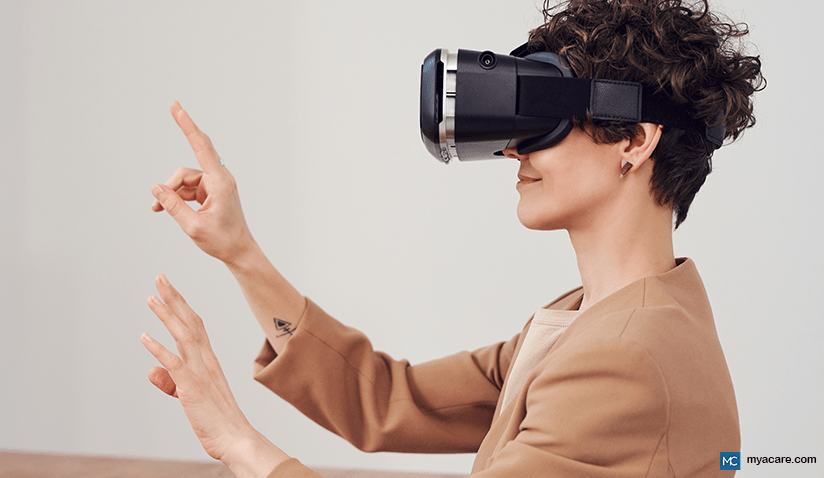TOP 10 FUTURE TRENDS OF HEALTHCARE LINED UP FOR THE 20S

With 2020 just around the corner, we're about to enter a new decade and with that, an entirely new era of medicine! Healthcare is about to take a leap into what most would have considered only possible in sci-fi movies.
The amount of data collected in the last few decades has trebled in size thanks to advances in technology. The more technological advances humanity makes, the quicker it becomes to collect information and create an even better technology. Thus the next decade of healthcare is predicted to rev up several orders of magnitude. From robots to even eradicating chronic disease; the future of healthcare is looking brighter every day.
Below we handpicked 10 of the best future trends of healthcare you can expect to see in the 2020's.
1. Better Integration of Artificial Intelligence
Artificial Intelligence (AI) has begun to make its way into people's lives and is also being used to crunch numbers and design flawless engineering models. This sophisticated life-like technology is forecast to experience an exponential increase in development with a much larger capacity that will improve global healthcare dramatically.
As futurist Michael Rogers has stated in his predictions on healthcare of the 2020's: "The next 10 years are about the virtualization of the world. That has only just begun." "The key is going to be the IT spine that runs throughout, and includes networks, connected data, and artificial intelligence to produce quantified outcomes and maximized quality."
As the age of information progresses, AI will be recruited more and more to process and consolidate the vast data that we have collected, particularly in the sphere of healthcare. Far more individualized protocols will be able to develop, particularly with the field of genetics expanding at such a rapid rate. Healthcare practitioners will be able to plug test results and symptoms into an AI database and get immediate results that will greatly enhance the way the physician tailors the protocol. Machine learning is much faster than human learning and is expected to be used far more to our advantage within the next 10 years!
Wrist wearables and other devices already exist that monitor a person's vitals and alert the individual when something is too high or low, as well as predicting a stroke and many other practical functions. In the next decade, more of this technology will guide the course of research, as well as research guiding the technology. Everyone using the technology will be able to add additional insight to the collective pool of medical knowledge and artificial intelligence will be utilized to organize all the information.
2. A Healthcare Reform and Shift in Focus to the Consumer
With technology that can flawlessly integrate all of humanity's collective medical information to deliver a perfect healthcare plan at any point in time, healthcare is already moving toward being completely dominated by the consumer. Futurists predict that in ten years' time, consumers will be more in charge of their own healthcare than ever before!
Healthcare trends over the last few years have already shifted gears in this regard, as more and more people are turning to google rather than visit the doctor. This is not just shaped by the amount of information we have access to at our very fingertips, but also by the economic climate on the planet at the moment. Insurance prices and costs are predicted to increase and less people will be able to afford healthcare plans.
Healthcare providers of the future will be forced to work with these trends and big technology giants like Google, Apple, Microsoft, Amazon and many more are already moving to integrate AI in their technology in such a way that makes this possible.
The patient will have full access to an infinitely expanding AI database of information at all times and be able to make a wider variety of informed decisions independently of their physicians. Imagine having artificial intelligence monitoring your vitals, running appropriate tests and then giving you real-time feedback of effective interventions should your current state of health need remedying!
While some are nervous that healthcare professionals will start becoming obsolete, but this is unlikely. Future healthcare predictions of the 2020s estimate that physicians will be integrated into this consumer-oriented reform in such a way that the patient will have access to one digitally at all times.
3. Diagnostic Tools from Sci-Fi Movies
As if the last two points were not sci-fi enough, the next decade of healthcare is forecast to enter Star Wars territory! As our understanding of genetics evolves, diagnostic tools will become highly specific, taking samples of DNA and quickly figuring out faults.
Our genes are the most accurate marker for our state of health possible and also the most complicated with all the major and minor variances of each person. Eventually, we will have mapped out every possible configuration of genes on the planet, which is estimated to lie in the trillions and beyond. It is predicted that AI-driven diagnostic tools will be able to quickly draw on our expanded knowledge and give accurate diagnoses and predictions.
Diagnostic tools are also predicted to become far more sophisticated and far less invasive by 2030. The better the technology gets, the less we will need to rely on blood samples and other relatively primitive diagnostic tools. One highly probable scenario is that healthcare of the future will rely on microchip implants and other human-machine technology that can offer a real-time view into the person's inner physiological status.
4. Robots That Will Help the Elderly
According to the Telegraph, Sebastian Conran and his colleagues at Consequential Robotics are developing robots that will improve healthcare for the elderly. Their intention was to improve the quality of life for the older generation and help us all to live independently for longer.
They are in the process of developing two types of robots for this: a companion robot and an assistive robot. The companion robot has been designed to ease the psychological burden in elderly individuals who live alone. These robots can answer back to simple questions and have been designed to perform simple tasks such as moving around the house, adjusting its height to reach in tall cupboards, making a cup of tea, bringing the person their medications at a specific time, etc.
That's just the tip of the iceberg! Japan has apparently started to also make assistive robots that can lift elderly patients out of bed and even cook meals, but these robots are still in their infancy. By the end of the 2020s, basic models are predicted to begin integrating into healthcare.
5. Multiple Diseases Will Become Things of the Past With Nano-Medicine
As stated, genetics are at the forefront of diagnostics, but they're also currently at the forefront of treatment. The sphere of nano-medicine is a newly developed field that looks at incredibly small particles which fall in the scale of DNA. The latest breakthroughs revolve around using viruses to eradicate disease by altering our genes in a beneficial manner.
While the theory is sound and promising results have already been obtained, more investigation is required before a non-toxic version of this therapy can be used. According to leading researchers in the field, the 2020s will see the first safe applications of this technology and with it, multiple conditions will fall away such as blindness and cancer!
6. Stem Cell Therapy
Stem cells are cells that have not decided what they want to be when they grow up, essentially non-specialized cells. They are the precursors to new cells and getting more of them technically could enhance regeneration of all bodily tissues in theory. There have been a few problems and complications arising out of stem cell therapies currently being tested but it is predicted that all the kinks will be worked out during this coming decade.
Stem cell therapy will be mostly used for conditions where organ damage is the primary cause - such as pancreatic damage in diabetes type 2.
On top of saying goodbye to many states of disease, future healthcare is bound to see a decrease in organ transplants as a result of stem cell therapy. The need for many other types of surgeries may also be averted within the 2020s due to this trend. In this way, healthcare is destined to become far less invasive and far more civilized.
7. Less Travel, More Reach
One of the squelching problems in the global scope of healthcare revolves around a lack of access to affordable healthcare. This is particularly prominent in poverty-stricken areas in developing countries, where patients lack the resources to travel far for their healthcare, while local suppliers and providers are often limited or lacking.
This problem will become a thing of the past by in the next few decades due to the progress being made in the "Internet of Things" and the creation of telemedicine. Telemedicine allows for doctors to consult with patients digitally through a video-chat interface, making healthcare accessible to the individual at home. Over the next decade with AI-diagnostic tools being thrown into the mix, it may not be necessary for anyone to visit a clinic for a check-up or a test.
Some of the biggest tech giants like Elon Musk are also working hard to ensure that the entire planet receives internet access, which would empower the healthcare of the future to connect on a global scale, putting an end to inaccessibility.
8. Virtual Reality Therapy for Neuro-Rehab
According to an article published in Time Magazine, one of the most innovative therapies that will be coming into play during the 2020s is virtual reality powered rehab. The brain technically can't discern the difference between when we are dreaming or awake, which is the precedence for how a therapy like this can work. Virtual reality games and mental exercises can combine visualization techniques with neuro-enhancing exercises to facilitate rehabilitation.
Current VR rehab is geared at increasing neuroplasticity in people. Research has shown that engaging your entire brain - which extends into the body - has better results on the outcome. Virtual reality demands you work your body out and engage in a 3D context with puzzles that enhance new growth and development in the brain.
The first iterations of these devices are already out but are predicted to become much more sophisticated in the next decade. We may be able to cure people from brain trauma in the 2020s with improvements in this technology!
9. Hi-End Medical Equipment Made Pocket-Sized for the Average Person
We used to consider sonar devices and medical lasers as being "hi-tech," but now that thinking is somewhat outdated as these devices are making their way into households!
In the next decade, more and more high-end medical devices are predicted to become intended for home use. Furthermore, pocket-sized versions of the same devices are being worked on to make it even more convenient. This is another great example of how healthcare of the 20s will be far more consumer-oriented too.
10. Digital Organs
With our new-found understanding of nanotechnology and the development of 3D printers, scientists managed to print the first ever functioning small scale heart this year in 2019!
For where non-invasive stem cell therapy may fall flat, 3D printing of organs may save the day and put an end to waiting lists. These two fields will likely also converge, creating a whole host of new and effective treatments. It is predicted that organ printing will be perfected in the next decade, theoretically having the potential to do away with most diseases and extend lifespans considerably!
In Conclusion
Nobody can say for sure what the future will hold. In spite of that, the face of healthcare appears to be at a turning point with future trends all pointing towards seamless AI integration and consumer-oriented care.
As technology improves, we may even find healthcare changing at a far more rapid rate than anyone could have anticipated, especially when considering AI's machine learning capacity. What we do know is that healthcare is on the verge of a profound change that will only push humanity forward to new heights of progress!
To search for the best healthcare providers worldwide, please use the Mya Care search engine.
Source
- https://www.healthcareitnews.com/news/futurist-predicts-what-healthcare-will-look-late-2020s
- https://www.managedhealthcareexecutive.com/article/six-healthcare-technologies-coming-next-10-years/page/0/3
- https://www.ncbi.nlm.nih.gov/pmc/articles/PMC3116776/
- https://www.telegraph.co.uk/wellbeing/future-health/healthcare-predictions/
- https://www.beckershospitalreview.com/innovation/12-innovations-that-will-transform-healthcare-in-the-next-decade.html
- https://www.neurorehabvr.com
- https://edition.cnn.com/2019/04/15/health/3d-printed-heart-study/index.html
Disclaimer: Please note that Mya Care does not provide medical advice, diagnosis, or treatment. The information provided is not intended to replace the care or advice of a qualified healthcare professional. Always consult your doctor for all diagnoses, treatments, and cures for any diseases or conditions, as well as before changing your healthcare regimen. Do not reproduce, copy, reformat, publish, distribute, upload, post, transmit, transfer in any manner or sell any of the materials in this blog without prior written permission from myacare.com.



